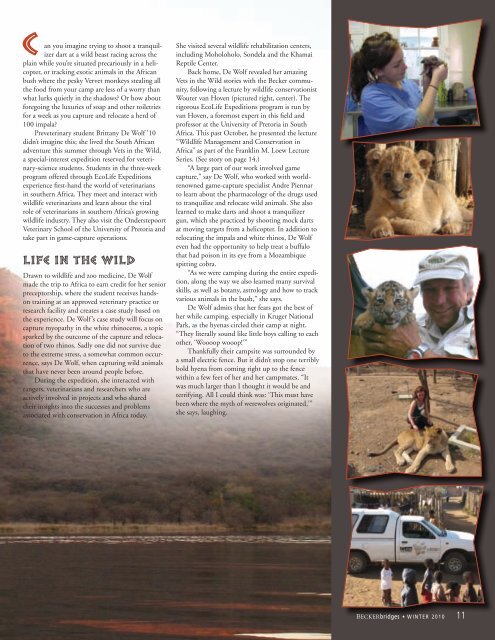You also want an ePaper? Increase the reach of your titles
YUMPU automatically turns print PDFs into web optimized ePapers that Google loves.
C an you imagine trying to shoot a tranquilizer<br />
dart at a wild beast racing across the<br />
plain while you’re situated precariously in a helicopter,<br />
or tracking exotic animals in the African<br />
bush where the pesky Vervet monkeys stealing all<br />
the food from your camp are less of a worry than<br />
what lurks quietly in the shadows? Or how about<br />
foregoing the luxuries of soap and other toiletries<br />
for a week as you capture and relocate a herd of<br />
100 impala?<br />
Preveterinary student Brittany De Wolf ’10<br />
didn’t imagine this; she lived the South African<br />
adventure this summer through Vets in the Wild,<br />
a special-interest expedition reserved for veterinary-science<br />
students. Students in the three-week<br />
program offered through EcoLife Expeditions<br />
experience fi rst-hand the world of veterinarians<br />
in southern Africa. They meet and interact with<br />
wildlife veterinarians and learn about the vital<br />
role of veterinarians in southern Africa’s growing<br />
wildlife industry. They also visit the Onderstepoort<br />
Veterinary School of the University of Pretoria and<br />
take part in game-capture operations.<br />
LIFE IN THE WILD<br />
Drawn to wildlife and zoo medicine, De Wolf<br />
made the trip to Africa to earn credit for her senior<br />
preceptorship, where the student receives handson<br />
training at an approved veterinary practice or<br />
research facility and creates a case study based on<br />
the experience. De Wolf’s case study will focus on<br />
capture myopathy in the white rhinoceros, a topic<br />
sparked by the outcome of the capture and relocation<br />
of two rhinos. Sadly one did not survive due<br />
to the extreme stress, a somewhat common occurrence,<br />
says De Wolf, when capturing wild animals<br />
that have never been around people before.<br />
During the expedition, she interacted with<br />
rangers, veterinarians and researchers who are<br />
actively involved in projects and who shared<br />
their insights into the successes and problems<br />
associated with conservation in Africa today.<br />
She visited several wildlife rehabilitation centers,<br />
including Moholoholo, Sondela and the Khamai<br />
Reptile Center.<br />
Back home, De Wolf revealed her amazing<br />
Vets in the Wild stories with the <strong>Becker</strong> community,<br />
following a lecture by wildlife conservationist<br />
Wouter van Hoven (pictured right, center). The<br />
rigorous EcoLife Expeditions program is run by<br />
van Hoven, a foremost expert in this fi eld and<br />
professor at the University of Pretoria in South<br />
Africa. This past October, he presented the lecture<br />
“Wildlife Management and Conservation in<br />
Africa” as part of the Franklin M. Loew Lecture<br />
Series. (See story on page 14.)<br />
“A large part of our work involved game<br />
capture,” say De Wolf, who worked with worldrenowned<br />
game-capture specialist Andre Piennar<br />
to learn about the pharmacology of the drugs used<br />
to tranquilize and relocate wild animals. She also<br />
learned to make darts and shoot a tranquilizer<br />
gun, which she practiced by shooting mock darts<br />
at moving targets from a helicopter. In addition to<br />
relocating the impala and white rhinos, De Wolf<br />
even had the opportunity to help treat a buffalo<br />
that had poison in its eye from a Mozambique<br />
spitting cobra.<br />
“As we were camping during the entire expedition,<br />
along the way we also learned many survival<br />
skills, as well as botany, astrology and how to track<br />
various animals in the bush,” she says.<br />
De Wolf admits that her fears got the best of<br />
her while camping, especially in Kruger National<br />
Park, as the hyenas circled their camp at night.<br />
“They literally sound like little boys calling to each<br />
other, ‘Woooop wooop!’”<br />
Thankfully their campsite was surrounded by<br />
a small electric fence. But it didn’t stop one terribly<br />
bold hyena from coming right up to the fence<br />
within a few feet of her and her campmates. “It<br />
was much larger than I thought it would be and<br />
terrifying. All I could think was: ‘This must have<br />
been where the myth of werewolves originated,’”<br />
she says, laughing.<br />
BECKERbridges WINTER <strong>2010</strong> 11






